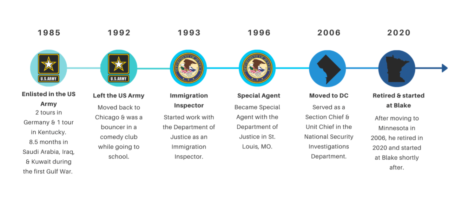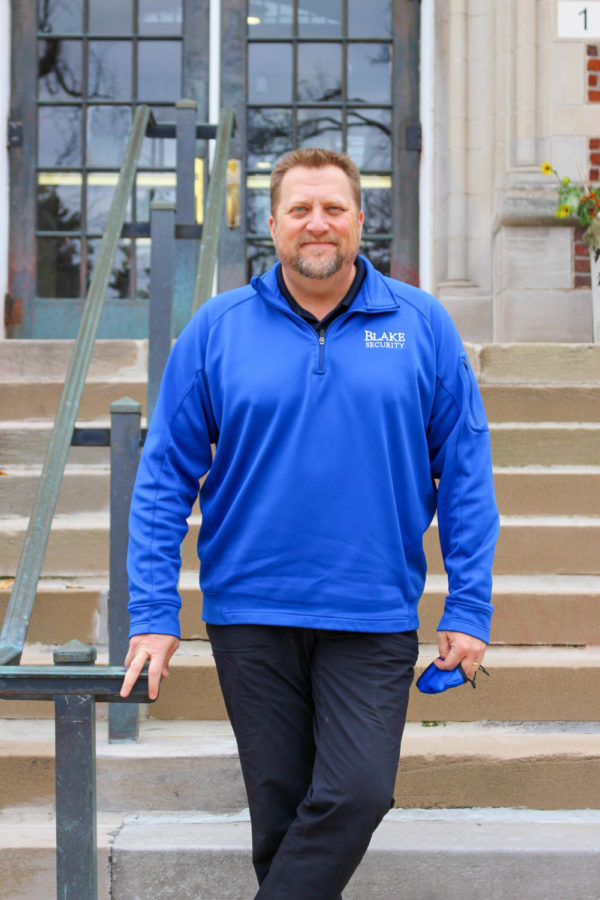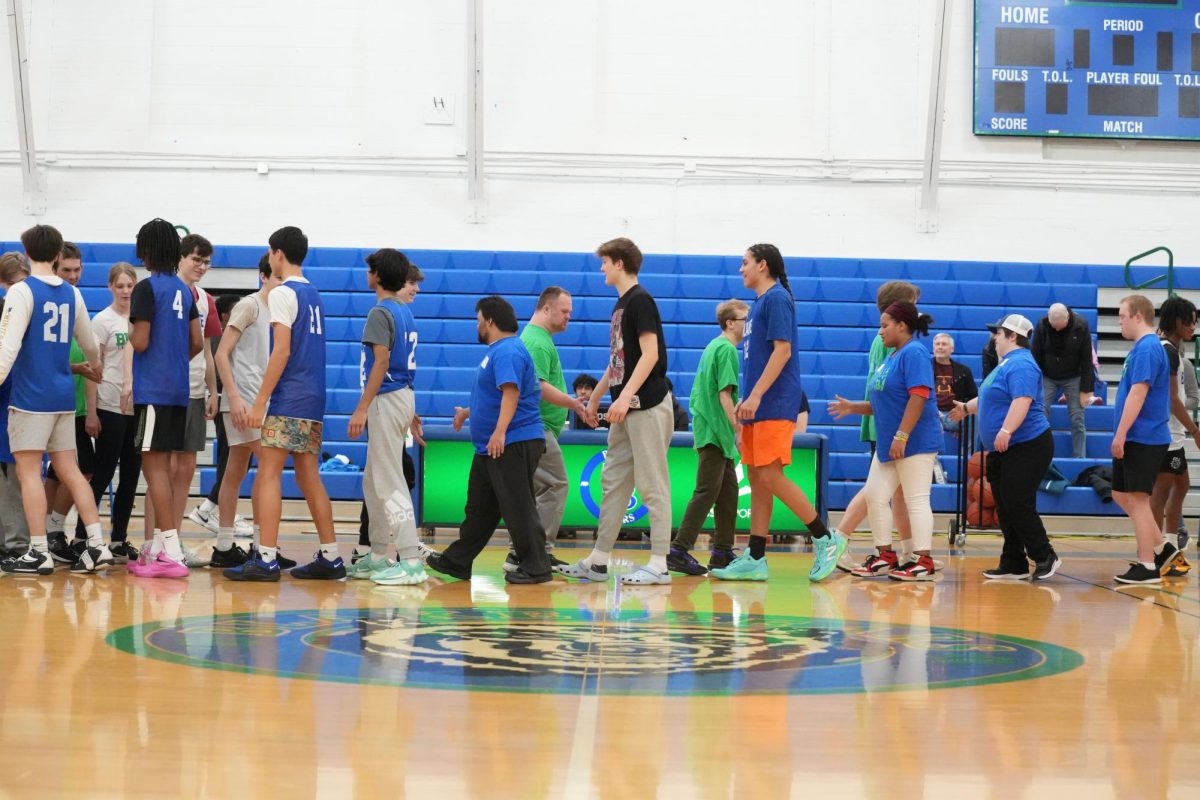Currently, Gene Paulauskas works as the Lead Security Officer after his tenure began in early Nov. 2020, but this is simply another stepping stone in his long list of successful and unique careers. Represented by the plaques that hang up in his office behind him, Paulaskas offers experience and a new perspective to the community.
According to the U.S. Department of Justice, many of his titles and careers within the federal government surrounded the development of investigative skills and expertise. He worked on utilizing analytical and critical thinking skills to perform sensitive investigations.
Paulauskas started off his career in the United States Army in 1985. He notes that, “I became a Military Police Sergeant and ended up serving six years including eight and a half months in Iraq during the first Gulf War. So I did Iraq and Saudi Arabia and came back in ‘92.”
Paulauskas’s action in the field while in Iraq with the military earned him the Bronze Star Medal awarded by the President of the United States. Bronze star medals are awarded to members of the Armed Forces for heroic achievements and service either generally or in a combat zone. For Paulaskas, he “was in charge of a convoy full of Iraqi prisoners of war.” While traveling through an area, an explosion began and they thought they were potentially under attack. However, “what happened, we figured out later, one of the survey crew kicked one of the smaller bomblets [from a cluster bomb] and it set off an Iraqi land mine field that they were sitting in. So the landmine went off and now they are sitting in a minefield so we stopped and when we realized we weren’t under attack I had to lead a crew in through the minefield and kind of probe our way in and find mines so we could find a route around the mines so we could give them first aid and get them out.”
Following his time in the military, Paulauskas found his passion in law enforcement in a chain of events. He explains, “I always wanted to get into law enforcement. Professionally that started when I was in the military and I was a military policeman. After doing that for six years I knew I wanted to continue.” In 2003 Paulauskas started with the U.S. Department of Homeland Security (DHS), in Chicago, where he was born. Created in that same year by President George W. Bush, Homeland Security serves to, as according to DHS, “secure the nation from the many threats we face”, at the time, it was terrorism following the events of 9/11. Paulausksas reflects, “The Criminal Investigators from the Immigration and Naturalization Service with the Department of Justice and Criminal Investigators from U.S. Customs Service came together and we all became one organization.”
Within the DHS, his job titles were numerous. He notes “I was a Criminal Investigator, I was a Supervisory Criminal Investigator, I was a Section Chief, I was a Unit Chief, I was an Assistant Special Agent in Charge, I was a Deputy Special Agent in Charge and that’s how I retired, as a Deputy Special Agent in Charge which basically means that I had oversight over 15 offices in five states and about 150 people. Criminal Investigators and support staff handle all the criminal investigations that the Department of Homeland Security touches, overseeing all the undercover operations, overseeing basically everything we did.” One such operation Paulaskas oversaw was a case relating to Thai women being trafficked. This case was special as he was able to see real change effected. He furthers, “We [the Minnesota district attorney and I] traveled to Bangkok and we addressed the Thai equivalent of their department of justice and their heads, a lot of members of their parliament and we discussed ways they could help combat trafficking. So that was pretty fulfilling”
At the start of his career before his large leadership roles he started off in the Midwest, he explains “First, I got out of the military and then as an investigator I bounced all over the place. First, started in Chicago, went to Saint Louis, Missouri for 11 1/2, and went to Washington, D.C, and then came here to take over the investigative program with the Department of Homeland Security in 2009 and have been in Minnesota ever since.”
Although he lived in the U.S. throughout his whole career, he wasn’t grounded here. He explains the benefits of his career path, he felt “It was awesome.” Paulauskas continues that he was able to travel the world. He explains, “I got to travel to a tiny little island called Tinian which is in the South Pacific which is kind of in-between Guam and Saipan and it’s actually famous for being the island where the nuclear bomb was loaded into the Enola Gay and so I was there on a smuggling investigation so international smuggling. I was the first Criminal Investigator to get attached to the FBI to get sent to Guantanamo Bay after 9/11 to continue that investigation against both the 9/11 terrorists and the on-going attacks against service members” His trip to Tinian rested on a specific investigation revolving around Chinese smugglers aptly named Snakeheads and involved a government loophole in Guam. Paulauskas explains, “These Snakeheads are Chinese smugglers who basically decided that they were going to take advantage of a kind of loophole that exists with Guam because of Guam’s status as being at a quasi U.S. possession. If they can land their smuggled immigrants onto Guam then the U.S. would have to take them in as refugees.” Eventually, Paualuskas and his team were able to bring the Snakeheads to justice, “In the end, the way I left the island was on a 747 that was chartered for just this purpose alone, [the passengers were] the pilot, the crew of the airplane, myself and I think 350 Chinese migrants. We flew from there to Honolulu and then from Honolulu to LAX and that’s where they came into our system, and because they’re all witnesses in this case they got visas and refugee visas.”
His job brought him new experiences like the aforementioned case and a sense of accomplishment, he adds “I got to meet tons of interesting people and got to put a lot of bad guys away, do a lot of really interesting investigations but mostly concerning fraud, obviously terrorism for a long time, human trafficking, smuggling. My office oversaw the largest human trafficking investigation that the United States Attorney’s office here in Minnesota ever prosecuted. So yeah, those are the good things. There’s not too many bad things about the career I had, it was wonderful I got to meet a lot of people.”
However, Paulauskas’s passion expands beyond his career into his hobbies. He explains, “So I love to ride motorcycles, I’ve got a BMW that I like to ride mostly and that’s the one a lot of people have seen parked outside in the summertime. I like to fish and… to hike in the wintertime… and to cross country ski… pretty much the normal outdoor Minnesota stuff.”
Despite this, his passion for hobbies didn’t fill enough time when it came time to decide on whether or not to get a retirement job. He notes, “ I didn’t plan on working after retirement, I have a fantastic pension and am very lucky, very fortunate…The opportunity came up and the more and more I thought about it, the more I kind of knew I wouldn’t be able to just rely on hobbies to keep me busy especially in the wintertime.” He furthers, “This opportunity came up at Blake and I just looked into it and thought this would be really something to cool to take on because like I said it’s really nice working in this environment, normally you know my whole concern was prosecutions and criminal investigations and dealing with the worst kind of people in society. And so, the thought to come to Blake and be able to work with kids, which is the best part of our society.”
Now, Paulauskas faces new challenges and although small compared to what his past jobs have entailed, they are nonetheless difficulties. The recent uptick in crime has been a concern of students, faculty, and alumni alike. An uptick in crime throughout the greater Minneapolis area isn’t just perception but reality. Paulauskas details, “The big crime stat that’s way up in the area is car jackings. It’s also one of the most dangerous because obviously there’s usually a weapon involved and scary things can happen.” Despite additional fears and safety concerns, Paulauskas outlines the steps security is taking to create the safest possible environment. By listening to concerns voiced by the community, Paulaskas works to mitigate potential security threats in order to keep the community safe. The security team has also been in contact with the park police who “are kind of the ones responsible for patrolling that area.” He furthers that “Every time that a student comes to us and says ‘hey there was someone that was creeping around,’ we try to get all that information to the park police and they’ve upped their patrol over there a little bit too. It’s just about staying vigilant. It’s about hoping that people, if they see something weird, feel comfortable enough to come to talk to us because security is not here to get people in trouble. Security is not here to be mean, or any of that stuff. We’re honestly here to help so we really love it when people come to us and say ‘hey we saw something and it just didn’t seem right’ and even if it’s nothing they can still come to us and we’ll check it out, pass it on and hopefully everyone’s a little safer because of that.”










